|
|
|
Sort Order |
|
|
|
Items / Page
|
|
|
|
|
|
|
| Srl | Item |
| 1 |
ID:
163831
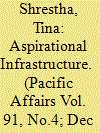

|
|
|
|
|
| Summary/Abstract |
This article contributes to the current scholarship on migration brokerage and infrastructure by revealing the contingent, experimental, and dynamic nature of recruiting work for foreign-employment recruitment agencies (FERAs) in Nepal. By situating Nepal’s migration infrastructure, or foreign employment (baidesik rojgar), within the nation’s social history and long-standing discourse on development (bikas), this paper argues for the importance of tracing the experimental character of an emergent migration infrastructure. In particular, I develop the concept of “aspirational infrastructure,” by which I mean the oft-overlooked experimental practices and practicalities that shape and direct the aspirations of those involved in foreign-employment recruitment work. The ethnography traces the intense encounter, intermediation, and interaction among the actors engaged in brokerage activities at FERA social spaces, where recruiters shape not only the social imaginaries and aspirations of potential migrants, but also their own. The recruitment work and migration brokerage rely on balancing the renewed vision and familiar discourse surrounding the “promise of livelihood,” and the reconfiguration of existing institutional norms, ultimately serving the state’s reprioritization of maintaining its “developing” status.
|
|
|
|
|
|
|
|
|
|
|
|
|
|
|
|
| 2 |
ID:
161134
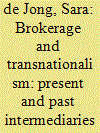

|
|
|
|
|
| Summary/Abstract |
This article brings two distinct sets of literatures in dialogue with one another: ethnohistorical studies on cultural brokerage and mediation in colonial/settler societies and studies of contemporary transnational activities. The article argues that this is productive because it throws into sharper relief three significant areas of contention that are a common thread of many empirical transnational studies, but are rarely of central concern. For each of these three identified aspects, respectively, the desire for mediation, social mobility, and mixed loyalties, it traces the historical resonance with cultural brokerage and shows how ethnohistorical research can complicate current transnational studies. It thereby challenges transnational scholarship’s focus on the newness of transnational exchange and demonstrates how ethnohistorical findings on brokers and mediators can aid the development of the research agenda of transnational studies.
|
|
|
|
|
|
|
|
|
|
|
|
|
|
|
|
| 3 |
ID:
112631
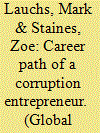

|
|
|
|
|
| Publication |
2012.
|
| Summary/Abstract |
The study of criminal career paths is necessary to understand the methods of success employed by high-performing criminals. The aim of this article is to focus on the career path of Jack Herbert who set up and maintained extensive corruption networks between organised crime groups and police in the Australian state of Queensland. This study builds on Morselli's work on the career paths of Sammy Gravano and Howard Marks that demonstrate how understanding social networks is an essential part of comprehending how organised criminals succeed. The data for this study were taken from the transcripts of the Fitzgerald Commission of Inquiry, which uncovered the extensive and resilient corruption network operated by Herbert. Herbert's relationships have been plotted to establish the nature of his operations. The findings indicate that communication of trust both allows for success and sets the boundaries of a network. Most importantly, this case study identifies Herbert's reliance on holding a monopoly as the cornerstone of his network power and position. This article adds to the literature on criminal career paths by moving away from a classic organised criminal grouping into the area of police corruption and uncovers the distinctive opportunities that this position offers the career criminal.
|
|
|
|
|
|
|
|
|
|
|
|
|
|
|
|
| 4 |
ID:
168480
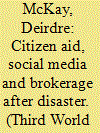

|
|
|
|
|
| Summary/Abstract |
In a crisis, aid providers deliver humanitarian relief across a hierarchy of organisations where influence and capacity map to their scale of operations. On the front lines of crises, ‘citizen aid’ is what small, local and informal groups offer to fellow citizens. These citizen aid groups are well-networked in place and tend to work through longstanding personal relationships. In the Philippines, citizen aid groups frequently support their activities by documenting their work with photos of beneficiaries to solicit donations from within the country and around the world across social media platforms. This paper builds on recent debates on brokerage through a case study of citizen aid in the relief effort after Typhoon Haiyan (2013–2017). Using this case-study approach, we demonstrate how social media has produced novel forms of brokerage shaped by circulating images online. This new kind of brokerage involves a layered network of brokers that both shapes citizen aid efforts and creates new channels for localising aid, enhancing the control of citizen groups in the Global South over aid.
|
|
|
|
|
|
|
|
|
|
|
|
|
|
|
|
| 5 |
ID:
161127
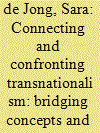

|
|
|
|
|
| Summary/Abstract |
This article traces the trajectory of transnationalism as a perspective and field of study and suggests that new impetus can be given to its development by establishing a dialogue between transnationalism and other key concepts. While the research agenda of the early stages was characterised by a need to distinguish transnationalism from related terms, such as globalisation, we argue that the field could now regain momentum by exploring synergies with other concepts. In this special issue we stage confrontations between transnationalism and, respectively, the (perspectives opened up by the) concepts of ‘borders’, ‘translocality’, ‘precarity’, ‘queer’, ‘moralities’, ‘the state’, and ‘brokerage’. Conceptually, this allows us to go beyond an internal critique that exposes the shortcomings of a transnational perspective, by suggesting novel frameworks and toolkits. Substantively, this issue’s articles demonstrate the need to refocus transnational studies’ attention to the unevenness, instability and inequality of transnational space.
|
|
|
|
|
|
|
|
|
|
|
|
|
|
|
|
| 6 |
ID:
124148
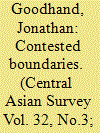

|
|
|
|
|
| Publication |
2013.
|
| Summary/Abstract |
In recent years there has been a growing focus in academic and policy circles on the changing roles of military and civilian actors in the context of multi-mandate peace and stabilization operations. This focus on 'civil-military cooperation' (CIMIC) and the related notion of the 'security-development nexus' reflect changed thinking about the causes of (and solutions to) to wars and insecurity, the role of external actors, and the balance between 'hard' and 'soft' forms of intervention. This article explores the civil-military interface in Afghanistan, focusing on the changing role of NGOs and specifically their growing but troubled relationship with externally promoted statebuilding and counterinsurgency. A recurring theme in the article is that of contested boundaries; CIMIC has been the site of intensive 'boundary work' in which NGOs and the military seek to negotiate or contest where boundaries are drawn and who has the power to draw (and police) them.
|
|
|
|
|
|
|
|
|
|
|
|
|
|
|
|
| 7 |
ID:
185582
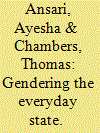

|
|
|
|
|
| Summary/Abstract |
This ethnographic article focuses on interactions between poor Muslim women, various intermediaries/brokers, and the Indian state. The article illustrates the complexities of claim-making and the forms of subjugation/marginalisation Muslim women experience when attempting to access resources, documents or paperwork. Contrary, however, to many representations of Muslim women’s engagements with the state, we also draw out agentive aspects as women hustle and negotiate to make claims and assert citizenship rights. Outcomes are variegated but also incorporate some women in brokerage roles, challenging assumptions regarding state/people mediation in India which foregrounds male brokers. The empirical detail is situated in a theoretical context incorporating gendered distinctions between shifting imaginaries of ‘nation’ and lived experiences of the ‘everyday state’. In a context where ‘nation’ has been evoked and articulated as a feminine form – through evocations of mata (mother) – we show how shifts towards a masculine imaginary, symbolised within Hindu-nationalist discourses, impacts Muslim women’s subjective experiences. We also illustrate that, whilst gendered imaginaries of ‘the nation’ are shifting, the ‘everyday state’ has long been experienced as a masculinised formation. Here we show how embodied involvements with the everyday state were constituted through gendered bureaucratic histories, spatial configurations, urban cosmologies and broader ideologies.
|
|
|
|
|
|
|
|
|
|
|
|
|
|
|
|
| 8 |
ID:
147528
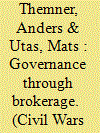

|
|
|
|
|
| Summary/Abstract |
There is currently a lack of knowledge about how elites rule post-civil war societies without strong state institutions. This paper argues that elites oftentimes overcome such institutional deficiencies by engaging in governance through brokerage. According to this perspective, elites outsource central state functions to influential broker figures. This is particularly true when dealing with war-affected groups that possess much violent agency. By functioning as social membranes, brokers can help elites and war-affected groups to redefine a new social contract. Liberia is employed as an example to illustrate the paper’s central arguments.
|
|
|
|
|
|
|
|
|
|
|
|
|
|
|
|
| 9 |
ID:
163829
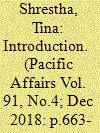

|
|
|
|
|
| Summary/Abstract |
This special issue develops brokerage as a historically specific category of practice to investigate its intricate link in shaping and sustaining Asian migration infrastructures. To understand this specific interconnection, the authors focus their analytical lenses on the emergence and functioning of migration infrastructures in the particular socio-cultural contexts of Nepal, Indonesia, the Philippines, and South Korea. Reflecting the “Asian infrastructural turn,” the collection examines diverse infrastructural forms, processes, and potentials embedded in, and in turn productive of, a range of brokerage activities, objects, institutions, and actors. Inspired by the ongoing methodological attention to the “migrant-broker” category, our ethnographic cases illuminate in various ways the specific social histories and political processes on which understandings of brokerage are based, and account for the different ways brokerage practices materialize across Asia. Of particular interest is the contingent social worlds of brokerage as they unfold in the everyday—through indeterminacy, unstable relational dynamics, institutional limits, and experimental possibilities—(re)organizing existing socio-cultural orders as well as convening infrastructural potentials.
|
|
|
|
|
|
|
|
|
|
|
|
|
|
|
|
| 10 |
ID:
147459
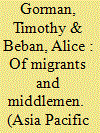

|
|
|
|
|
| Summary/Abstract |
In a possible sign of a new trend in Southeast Asia, economic pressures are driving smallholder shrimp farmers from Vietnam's Mekong Delta across the Cambodian border in search of new land. Building from ethnographic research with Vietnamese shrimp farmers in Kampot province, Cambodia, this paper explores the structures, mechanisms and relations that facilitate and impede the ability of Vietnamese migrants to gain and maintain access to land in Cambodia. The Vietnamese migrants in our study bring capital and farming skills, but their ambiguous legal status and their lack of social networks and experience with the terms of access in Cambodia render them vulnerable to exclusion and dependent on a local broker to mediate their interactions with landowners and authorities. We recount the migrants' attempts to overcome the uncertainty of their mediated access by bypassing the broker and cultivating direct social ties with Khmer villagers, border authorities and the landowners themselves. This study generates new insights into the dynamics of cross-border livelihoods in mainland Southeast Asia and more broadly illuminates the central importance of migrant–broker relationships and migrant agency in seeking to overcome dependency on brokers by forging new social relations in border areas.
|
|
|
|
|
|
|
|
|
|
|
|
|
|
|
|
| 11 |
ID:
111513
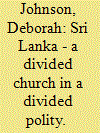

|
|
|
|
|
| Publication |
2012.
|
| Summary/Abstract |
In different fields of academia today there is renewed interest in the relationship between religion and politics. However, this literature often focuses on beliefs such as extremism and nationalism at the expense of historically contextualized discussion about the organization and practices associated with religion. As analysts observe the 'retreat' of the promise of secular modernity, it is easy to be left with little or no grounded understanding of how religious organizations are engaging in spaces of contested politics or how this engagement can help us to understand more appropriately what 'religion' or 'politics' mean to individuals and communities on personal and organizational levels. Within this broader debate, this paper introduces a research project that explores one form of religious practice: the ability of religious leaders to cross violent or politicized borders in times of contestation and conflict. The empirical focus on the Sri Lankan Catholic Church, in Tamil areas in the north, presents the activity of priests in such circumstances as a form of 'brokerage', facilitated and constrained by their religious, institutional setting.
|
|
|
|
|
|
|
|
|
|
|
|
|
|
|
|
| 12 |
ID:
159178
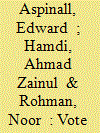

|
|
|
|
|
| Summary/Abstract |
What underlying logic explains candidate participation in vote buying, given that clientelist exchange is so difficult to enforce? We address this question through close analysis of campaigns by several dozen candidates in two electoral districts in Java, Indonesia. Analyzing candidates’ targeting and pricing strategies, we show that candidates used personal brokerage structures that drew on social networks to identify voters and deliver payments to them. But these candidates achieved vote totals averaging about one quarter of the number of payments they distributed. Many candidates claimed to be targeting loyalists, suggestive of “turnout buying,” but judged loyalty in personal rather than partisan terms, and extended their vote-buying reach through personal connections mediated by brokers. Candidates were market sensitive, paying prices per vote determined not only by personal resources, but also by constituency size and prices offered by competitors. Accordingly, we argue that a market logic structures Indonesia's system of vote buying.
|
|
|
|
|
|
|
|
|
|
|
|
|
|
|
|
|
|
|
|
|